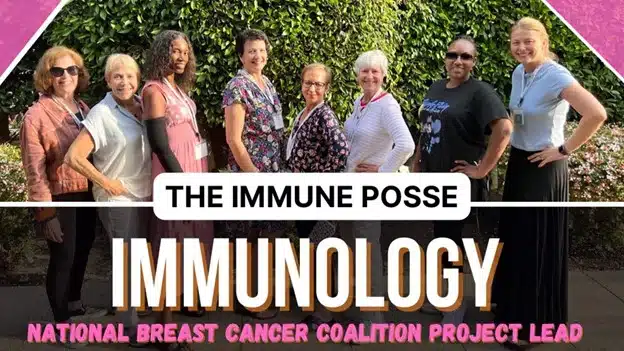PUBLISHED: 2nd November 2022

by Laurie Spiegel
This past summer, I had the opportunity to attend a weeklong, deep-dive training course in the science and biology of breast cancer, offered by the National Breast Cancer Coalition (NBCC). As a FORCE Peer Navigator, FORCE-trained research advocate through the FRAT program and newly installed member of the Board of Directors, I was looking to build on my self-acquired knowledge base to be a better breast cancer advocate. NBCC’s Project Lead was the right choice for me.
The science of breast cancer is multidimensional and runs deep, from its biology to cutting-edge research and approaches to treatment, and it continues to advance at an increasing pace. Our group of 35 advocates gathered in San Diego to learn from some of the best professors and researchers. We basically had a college semester’s worth of training in Genetics, Epidemiology and Immunology. My training colleagues were interested, engaged, friendly and fun. We shared our personal stories over meals and worked together in small study groups to review the material and answer many tough questions. The program was well-organized, the leaders were supportive and caring and the quality of education was outstanding.
I came away with a sense of awe in the science that has been discovered, and the dedication of the scientists who continue to learn, teach and uncover that which remains unknown. I see the knowledge I’ve gained through Project Lead and the relationships I’ve developed as catalysts for expanding my level of engagement as a breast cancer advocate. In my peer navigation role, I feel better prepared to support women with a wider range of cancer types and stages and to discuss the latest in treatment options. At the same time, I can more confidently participate in research advocacy areas such as cutting-edge surveillance methods, testing protocols, immunotherapies and vaccines.
As a breast cancer survivor and patient advocate, I believe that education is fundamental to making informed choices and invoking change. I hope to use my training to help inform others, who in turn will be able to make better choices for themselves and perhaps become an advocate as I have. Thus, I become a vital link in a chain of many for advocacy and change.
3 Comments
December 25, 2023
I resonate deeply with the sentiment that education has prepared me to be a better advocate. As an educational advocate, my journey through learning has equipped me with the knowledge, skills, and empathy needed to champion the rights and opportunities of students. Every lesson learned has strengthened my commitment to ensuring equitable access to quality education. I believe in the transformative power of education, and as an advocate, I am dedicated to empowering others through the gift of knowledge. Here's to the ongoing journey of growth and advocacy in the realm of education
Kelli Haas & Associates
Reply
December 2, 2022
Hi. Education is key to making decisions when it comes to cancer. I had DCIS in Situ in 2018. I also have the BRCA2 Mutation. I had a bilateral mastectomy in 2018, and a complete hysterectomy in 2020. I was told the prognosis of DCIS patients is great. However, I just got diagnosed with metastatic ductal carcinoma. It’s in my lymph nodes, liver, and bones. Devastating news! I wish I would have been a better advocate for myself and demanded screening each year. My surgeon told me I didn’t need screening because I had the mastectomy.
Heather Canaday
Reply
December 5, 2022
I am so sorry to hear this, Heather. I believe you did all the right things!! Please try not to blame yourself. Spend your energy on continuing to educate yourself and finding the best resources and care for your current diagnosis. FORCE is here for you to help. All the best to you. - Laurie
Laurie Spiegel
Reply